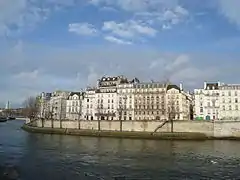Quai d'Orsay
The Quai d'Orsay (/ˌkeɪ dɔːrˈseɪ/ KAY dor-SAY, French: [ke dɔʁsɛ] (![]() listen)) is a quay in the 7th arrondissement of Paris, part of the left bank of the Seine, and the name of the street along it. The Quai becomes the Quai Anatole-France east of the Palais Bourbon, and the Quai Branly west of the Pont de l'Alma.
listen)) is a quay in the 7th arrondissement of Paris, part of the left bank of the Seine, and the name of the street along it. The Quai becomes the Quai Anatole-France east of the Palais Bourbon, and the Quai Branly west of the Pont de l'Alma.

The French Ministry of Foreign Affairs is located on the Quai d'Orsay, and thus the ministry is often called the Quai d'Orsay by metonymy.
The Quai (rue du Bac) has historically played an important role in French art as a location to which many artists came to paint along the banks of the river Seine.
The building of the Ministry of Foreign Affairs was developed between 1844 and 1855 by Jacques Lacornée. The statues of the facade were created by the sculptor Henri de Triqueti (1870). The Ministry of Foreign Affairs was the place where the Treaty of Versailles was written.
Name's origin
The Quai d'Orsay is named after Charles Boucher, Lord of Orsay, who was appointed administrator of commerce for the city of Paris from 1700 to 1708. Orsay is a town 21 km south of Paris' centre.
Gallery
 A Metro sign
A Metro sign.jpg.webp) The Ministry of Foreign Affairs (1844-1855)
The Ministry of Foreign Affairs (1844-1855)
External links
- Official web site of the Ministry building
- Musée d'Orsay: History of the site
- . New International Encyclopedia. 1905.